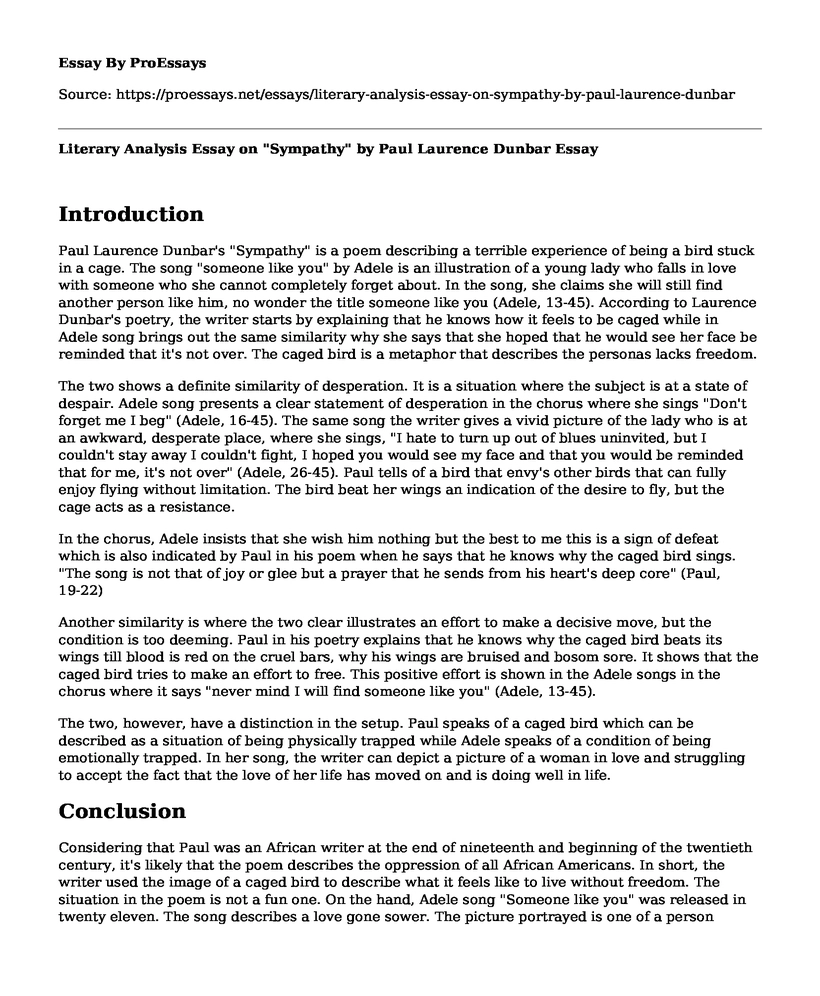Introduction
Paul Laurence Dunbar's "Sympathy" is a poem describing a terrible experience of being a bird stuck in a cage. The song "someone like you" by Adele is an illustration of a young lady who falls in love with someone who she cannot completely forget about. In the song, she claims she will still find another person like him, no wonder the title someone like you (Adele, 13-45). According to Laurence Dunbar's poetry, the writer starts by explaining that he knows how it feels to be caged while in Adele song brings out the same similarity why she says that she hoped that he would see her face be reminded that it's not over. The caged bird is a metaphor that describes the personas lacks freedom.
The two shows a definite similarity of desperation. It is a situation where the subject is at a state of despair. Adele song presents a clear statement of desperation in the chorus where she sings "Don't forget me I beg" (Adele, 16-45). The same song the writer gives a vivid picture of the lady who is at an awkward, desperate place, where she sings, "I hate to turn up out of blues uninvited, but I couldn't stay away I couldn't fight, I hoped you would see my face and that you would be reminded that for me, it's not over" (Adele, 26-45). Paul tells of a bird that envy's other birds that can fully enjoy flying without limitation. The bird beat her wings an indication of the desire to fly, but the cage acts as a resistance.
In the chorus, Adele insists that she wish him nothing but the best to me this is a sign of defeat which is also indicated by Paul in his poem when he says that he knows why the caged bird sings. "The song is not that of joy or glee but a prayer that he sends from his heart's deep core" (Paul, 19-22)
Another similarity is where the two clear illustrates an effort to make a decisive move, but the condition is too deeming. Paul in his poetry explains that he knows why the caged bird beats its wings till blood is red on the cruel bars, why his wings are bruised and bosom sore. It shows that the caged bird tries to make an effort to free. This positive effort is shown in the Adele songs in the chorus where it says "never mind I will find someone like you" (Adele, 13-45).
The two, however, have a distinction in the setup. Paul speaks of a caged bird which can be described as a situation of being physically trapped while Adele speaks of a condition of being emotionally trapped. In her song, the writer can depict a picture of a woman in love and struggling to accept the fact that the love of her life has moved on and is doing well in life.
Conclusion
Considering that Paul was an African writer at the end of nineteenth and beginning of the twentieth century, it's likely that the poem describes the oppression of all African Americans. In short, the writer used the image of a caged bird to describe what it feels like to live without freedom. The situation in the poem is not a fun one. On the hand, Adele song "Someone like you" was released in twenty eleven. The song describes a love gone sower. The picture portrayed is one of a person struggling to cope up with the current reality.
Work CitedAdele Laurie Blue Adkins hit "someone like you" Record Label(s): 2010 XL Records Ltd
Paul Laurence Dunbar's "Sympathy" 1899 lyrics of the Hearthside
Cite this page
Literary Analysis Essay on "Sympathy" by Paul Laurence Dunbar. (2022, Nov 06). Retrieved from https://proessays.net/essays/literary-analysis-essay-on-sympathy-by-paul-laurence-dunbar
If you are the original author of this essay and no longer wish to have it published on the ProEssays website, please click below to request its removal:
- William Shakespeare's A Midsummer Night's Dream Essay
- Psychological Analysis of "A Narrow Fellow in the Grass" and "O to Be A Dragon"
- Diverging Aspects of Life in the Story "A Clean, Well-Lighted Place" Essay
- The Fall of the House of Usher Analysis Paper Example
- Mary Shelley's Frankenstein: Man-Made Monster and Its Creator - Essay Sample
- Essay Sample on U.S. Joins WW1 After Neutrality: Wilson's Reluctance
- Singapore - Literary Analysis Essay







